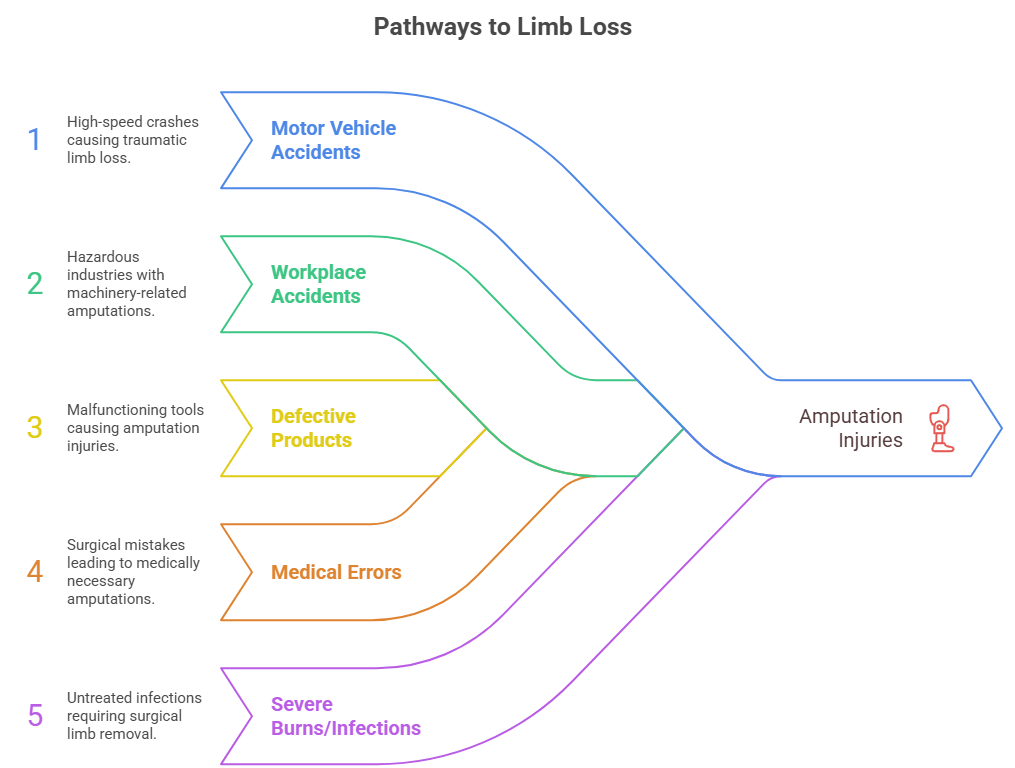Texas Amputation Injury Lawsuits: Costs, Care, and Compensation
Losing a limb is one of the most devastating injuries anyone can face. It doesn’t just impact your physical health – it can disrupt your job, your independence, and your entire way of life. If your amputation was caused by someone else’s actions – or their failure to act – you may have the right to seek compensation.
Yes, you can sue for an amputation injury in Texas if negligence, a dangerous product, or unsafe conditions played a role in your loss.
But this isn’t just another personal injury claim. These cases involve extensive medical care, high prosthetic costs, and future expenses that can stretch for decades. That’s why it’s critical to understand how Texas law handles these injuries, what kind of damages you can pursue, and how to protect yourself right from the start.
This guide walks you through the key legal issues: who may be liable, what you’ll need to prove, and what steps to take after an accident that changes your life forever.
What Are Common Causes of Amputation Injuries in Texas?
Amputation injuries can happen in a split second, but the impact can last a lifetime. In Texas, these injuries are often linked to high-risk jobs, roadway crashes, or defective equipment – but they can also happen in everyday settings when safety is ignored.

Here are some of the most common causes of amputations in Texas:
- Motor vehicle accidents
Serious crashes, especially those involving motorcycles, commercial trucks, or high-speed impacts, can result in traumatic limb loss. When another driver is at fault, a personal injury claim may cover both the injury and long-term recovery costs. - Workplace accidents
Texas is home to high-hazard industries like construction, oil and gas, and heavy manufacturing. On-the-job amputations often involve machinery, crush injuries, or explosions. If the employer doesn’t carry workers’ compensation – or a third party caused the injury – you may be able to sue. - Defective products or tools
A power tool, industrial machine, or even a vehicle component can lead to amputation if it malfunctions or lacks proper safety features. These product liability cases focus on design flaws, poor manufacturing, or failure to warn. - Medical errors
Sometimes, an avoidable mistake during surgery or the delayed treatment of an infection can lead to a medically necessary amputation. In those cases, a medical malpractice claim may apply. - Severe burns or infections
Infections from untreated wounds, electrical injuries, or burn complications may require surgical removal of tissue or limbs.
In every one of these scenarios, the amputation didn’t “just happen.” If someone else’s negligence contributed to it, they can be held legally responsible under Texas law.
Who Can Be Held Liable for an Amputation Injury in Texas?
After an amputation injury, one of the most important legal questions is: Who is responsible? In Texas, liability depends on who had a legal duty to keep you safe – and whether their actions (or inaction) caused your injury.
Depending on how and where the injury happened, one or more of the following parties may be held liable:
Negligent drivers
If a car, truck, or motorcycle crash led to the amputation, the at-fault driver can be sued. This includes reckless driving, distracted driving, DUI, or any traffic violation that caused the crash.
Employers and contractors
In many Texas industries, workers are exposed to dangerous conditions every day. If you were hurt on the job and your employer doesn’t carry workers’ compensation (Texas allows this), they can be sued for negligence. Even if they do have coverage, a third-party contractor, equipment supplier, or property owner may still be liable.
Manufacturers and sellers of defective products
If a defective machine, tool, or vehicle part caused your injury, you may have a product liability claim. These lawsuits don’t require proof of negligence – only that the product was unreasonably dangerous due to its design, manufacturing, or labeling.
Property owners or businesses
If you were injured because of unsafe premises – like a faulty gate, collapsing structure, or exposed machinery – a property owner, landlord, or business operator could be held responsible under premises liability laws.
Medical professionals or hospitals
If a preventable infection was ignored or a surgical error led to an unnecessary amputation, a medical malpractice claim may apply. These cases require a special process and often involve expert testimony.
Real talk: Liability in amputation cases can be complicated. Often, multiple parties share fault. A good attorney will investigate every angle to identify who may be responsible and pursue all available sources of compensation.
What Do You Have to Prove in a Texas Amputation Injury Claim?
If you’re considering a personal injury lawsuit for an amputation, it’s not enough to simply show that you were hurt. You have to prove, step by step, that someone else was legally at fault – and that their actions caused your loss.
In Texas, amputation injury claims follow a basic negligence framework. Here’s what you’ll need to prove:
1. Duty of care
The defendant (a person, company, or property owner) had a legal obligation to act safely and reasonably under the circumstances.
2. Breach of that duty
They failed to meet that obligation. Maybe a driver ran a red light, a business ignored a known hazard, or a machine was sold with a dangerous defect.
3. Causation
Their breach directly caused your injury. You’ll need to show that the accident wouldn’t have happened if they had acted responsibly – and that it led to your amputation.
4. Damages
You suffered real, measurable losses. This can include medical costs, prosthetics, lost income, and the profound physical and emotional effects of limb loss.
Texas follows a modified comparative fault rule. If you’re found to be 51% or more responsible for your own injury, you cannot recover damages. If you’re less than 51% at fault, your compensation is reduced by your percentage of fault.
Example: If you’re awarded $500,000 but were 20% at fault, you’d receive $400,000.
What Compensation Can You Get – Including Prosthetics and Long‑Term Costs?
Amputation injuries don’t just affect your physical health. They affect your finances, your lifestyle, your career – and your sense of self. That’s why Texas law allows you to seek a wide range of damages through a personal injury claim.
Here’s what you may be entitled to recover:
Economic Damages (Tangible Financial Losses)
- Medical expenses
Surgeries, hospital stays, rehabilitation, pain management, and follow-up care. - Prosthetics and assistive devices
High-quality prosthetic limbs can cost $5,000 to $70,000 – and most need to be replaced every 3–5 years. You may also need specialized footwear, mobility aids, or computer-access tools. - Home and vehicle modifications
Ramps, stair lifts, widened doorways, and adapted vehicles are common after limb loss. These costs can run into the tens of thousands. - Lost income
If you’ve had to take time off work or lost your job because of your injury, you can claim wages you’ve already missed. - Loss of future earnings
If your amputation limits your ability to work or earn at the same level as before, your claim can include projected long-term income losses.
Non-Economic Damages (The Human Impact)
- Pain and suffering
Chronic pain, phantom limb sensations, and physical limitations can drastically affect quality of life. - Emotional distress
Many amputees struggle with anxiety, depression, PTSD, or social withdrawal after a traumatic loss. - Disfigurement and loss of function
Texas law recognizes the lasting impact of permanent physical changes – including scars and the daily challenges of limb loss. - Loss of enjoyment of life
If your injury keeps you from doing things you used to love – like playing music, gardening, or simply being independent – you can include that in your damages.
Why prosthetics matter so much in legal claims: Most insurance policies cover only basic prosthetic models. But many amputees need custom limbs for walking, driving, parenting, or returning to work. A good injury claim ensures these future needs are considered – not just your current bills.
What Challenges and Roadblocks Do Amputation Claims Face in Texas?
Even when it’s obvious you’ve suffered a life-changing injury, personal injury claims involving amputations can be tough. These are high-value cases, which means insurers and defense teams may dig in to fight every dollar.
Here are some of the most common hurdles you might face:
1. Insurance companies fight hard on high-stakes claims
Amputation cases often involve significant damages – sometimes well into the millions. That makes insurers more aggressive. They may dispute the severity, delay the process, or offer quick settlements hoping you’ll take less than you deserve.
2. Multiple parties might be responsible
In many cases, more than one person or company may be at fault. Maybe a driver caused a crash, but the seatbelt malfunctioned too. Maybe you were hurt at work, but it was a contractor – not your employer – who was negligent. This adds complexity and requires careful investigation.
3. Future costs are hard to calculate – and easy to underestimate
Prosthetics, therapy, home adjustments, job retraining – these costs can continue for decades. But without expert input, insurers may try to undercut or deny future damages. A strong claim must clearly project what your life will require.
4. Texas has legal limits on fault
If you’re found 51% or more at fault for your injury, Texas law bars you from receiving compensation. Even if you’re partially at fault, your award will be reduced. This makes it essential to push back early against any effort to shift blame.
5. Pressure to settle too soon
It’s common to feel overwhelmed after an amputation. Insurers know this – and may offer fast cash to close the case. But accepting a settlement before understanding the full scope of your future needs could leave you undercompensated for life.
The key takeaway? Amputation cases aren’t just about proving you were hurt – they’re about proving the full cost of your loss and holding every responsible party accountable. That’s why these cases are best handled with experienced legal guidance from the start.
How Long Do You Have to File an Amputation Injury Lawsuit in Texas?
After a traumatic injury, legal deadlines might not be the first thing on your mind – but they’re critical. In Texas, the law gives you a limited window to take action.
The standard deadline: 2 years
Under Texas Civil Practice and Remedies Code § 16.003, most personal injury lawsuits – including those involving amputation – must be filed within two years from the date of the injury. If you miss this deadline, your case can be dismissed, no matter how strong it is.
Are there any exceptions?
Yes – but they’re narrow.
- If you didn’t discover the injury right away (rare in amputation cases), a court may allow some flexibility under the “discovery rule.”
- If the injured person is a minor or was mentally incapacitated, the clock may pause (“toll”) until they’re legally able to act.
- If the at-fault party is a government entity, like a city or county agency, you may need to file formal notice within just 6 months, sometimes even sooner, or lose your right to sue entirely.
Bottom line: Don’t wait.
The longer you delay, the harder it becomes to collect evidence, locate witnesses, and build a strong case. A Texas personal injury attorney can quickly determine your timeline and protect your right to recover compensation.
What Should You Do Immediately After an Amputation Injury?
In the moments and weeks after a traumatic injury, it’s easy to feel overwhelmed. But if you’ve suffered an amputation – whether at work, in a crash, or due to a dangerous product – taking the right steps early can make a massive difference in your recovery and your legal case.
Here’s what you should do as soon as possible:
1. Get all recommended medical care
Don’t delay or skip follow-up care. Surgery, therapy, prosthetic fittings – these records become key evidence for your claim and reflect the seriousness of your injury.
2. Document everything
Take photos of your injuries, the accident scene (if possible), the defective equipment, and anything related to the incident. Keep every receipt, report, and bill.
3. Report the injury
- If it happened at work, report it to your employer and request a copy of the incident report.
- If it happened in a business or public place, notify the manager or owner.
- For vehicle accidents, file a police report and request a copy.
4. Start a paper trail
Keep a folder – digital or physical – with all your medical records, doctor’s notes, work restrictions, prescriptions, therapy progress, and time missed from work.
5. Don’t talk to insurance adjusters alone
They’re trained to minimize payouts. Avoid giving recorded statements or signing anything without speaking to an attorney.
6. Contact an experienced Texas amputation injury attorney
A lawyer who’s handled amputation cases will know how to preserve evidence, project long-term costs (like prosthetics and lost income), and deal with insurers who want to settle quickly – and cheaply.
FAQs About Amputation Injury Lawsuits in Texas
How are prosthetic costs handled if I need upgrades or replacements later in life?
Prosthetic limbs often require replacement every 3 to 5 years, and advanced models can cost tens of thousands of dollars. A well-prepared injury claim in Texas should account not just for your current device, but for future replacements, maintenance, and fitting services. Expert testimony is often used to project these long-term costs.
Can I file a lawsuit if I had to amputate due to a delayed diagnosis or infection?
Yes, but this would typically fall under a medical malpractice claim. These cases have special rules in Texas, including expert certification and damage caps. If a hospital or provider failed to diagnose or treat an issue that led to surgical amputation, you may still have a claim – but the process differs from other injury suits.
What if I was injured while using a rented tool or shared equipment?
If the equipment was defective or poorly maintained – and owned by someone else (like a rental company or employer) – they may be liable for your injury. Product liability and premises liability can both come into play, especially in workplace or construction settings.
Are there support resources for amputees in Texas?
Yes. Organizations like the Amputee Coalition, Texas Workforce Solutions-Vocational Rehabilitation Services, and Dallas Amputee Network offer help with prosthetic access, mobility training, mental health, and employment. These resources aren’t part of your lawsuit, but they can support your recovery while your case moves forward.
Will my case go to trial, or can it be settled out of court?
Most personal injury claims in Texas – especially catastrophic injury cases like amputations – are settled outside of court. However, if the insurance company won’t offer a fair amount or there’s a dispute over fault, your attorney may recommend filing a lawsuit and preparing for trial. A strong case often encourages fair settlement without needing a courtroom.
What to Do If You’ve Suffered an Amputation Injury in Texas
An amputation injury changes everything – your mobility, your finances, your future. If that loss was caused by someone else’s negligence, you deserve more than sympathy. You deserve answers, accountability, and compensation that reflects your long-term needs.
Call Dallas personal injury attorney Aaron Genthe at Genthe Law Firm today at (214) 957-0898.
He’ll walk you through your legal options, protect your rights, and make sure your recovery – physical and financial – gets the full support it deserves.
You’ve already survived the hardest part. Let us help you with what comes next.
Page Contents
- Texas Amputation Injury Lawsuits: Costs, Care, and Compensation
- What Are Common Causes of Amputation Injuries in Texas?
- Who Can Be Held Liable for an Amputation Injury in Texas?
- What Do You Have to Prove in a Texas Amputation Injury Claim?
- A note on shared fault in Texas
- What Compensation Can You Get – Including Prosthetics and Long‑Term Costs?
- What Challenges and Roadblocks Do Amputation Claims Face in Texas?
- How Long Do You Have to File an Amputation Injury Lawsuit in Texas?
- What Should You Do Immediately After an Amputation Injury?
- FAQs About Amputation Injury Lawsuits in Texas
- What to Do If You’ve Suffered an Amputation Injury in Texas



